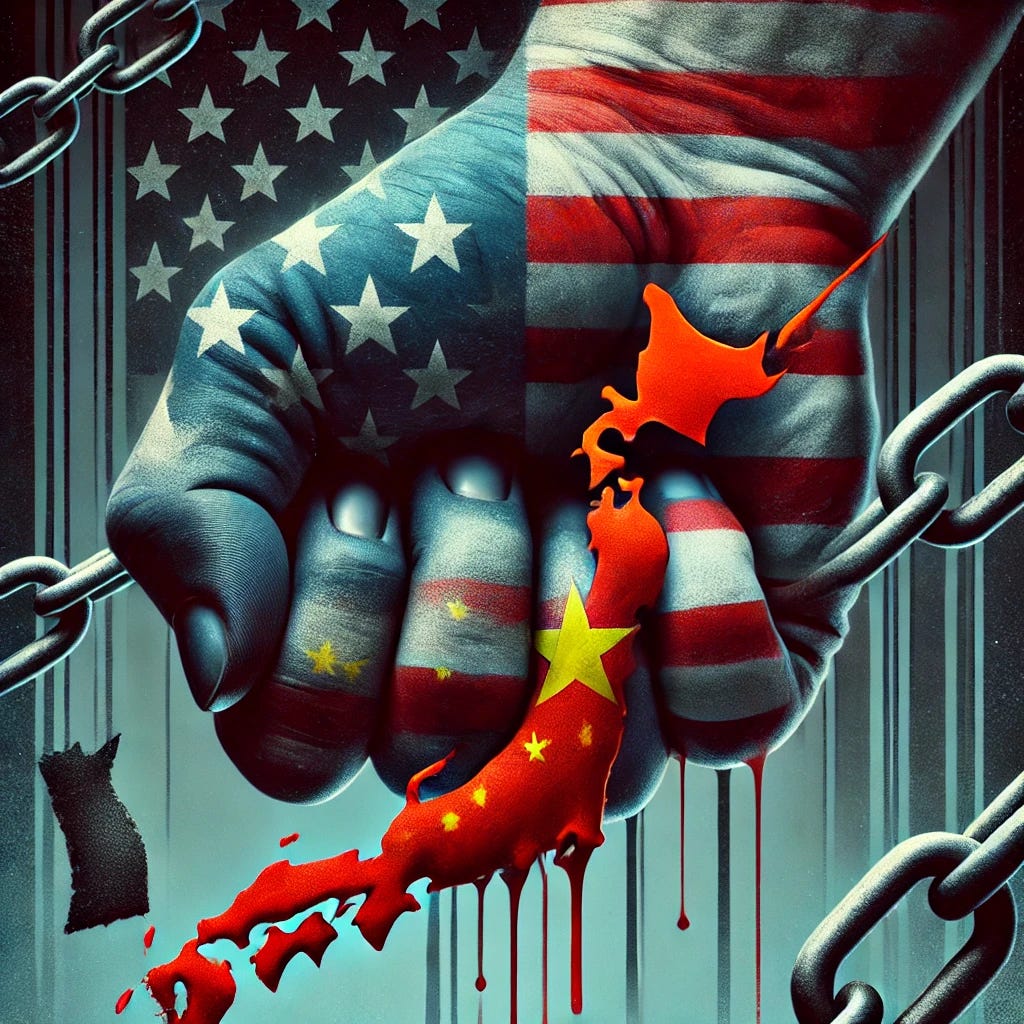Japan’s Silent Fall — A Warning Even for the Strongest Nations
The silent dependency on China, the invisible leash from America, and why only outsiders can rebuild.
Japan is no longer sovereign.
Beneath the pride, it’s a hostage — chained by China’s production and America's technology.
And almost no one dares to say it.
Before we dive in —
This piece was inspired by Kyarmin Nalawala’s powerful article, "Will Tariffs Really Hurt the U.S., or Was China Just a Test?".
Reading it reframed how I see not just America's strategy — but also Japan's deep, silent dependencies.
This essay builds on that perspective, with a focus on Japan’s hidden vulnerabilities and the urgent need for true reconstruction.
Opening
Japan looks autonomous on the surface.
A self-sufficient economy. A proud manufacturing culture. A modern, independent nation.
But if you peel back the thin layer of pride, the reality is clear:
Japan is trapped in a silent but brutal dependency — pulled by China’s production engines and shackled by America's technological dominance.
And hardly anyone talks about it.
The smartphone you’re holding?
The medical equipment in your nearest clinic?
The components inside your car?
All riding on invisible lifelines stretching across oceans — to factories, to patents, to systems Japan no longer owns.
The question isn't if Japan is independent.
The question is: When did it stop being independent?
Japan’s Silent Dependency
Japan's industrial strength has long been a myth carefully maintained for domestic comfort.
In reality:
China supplies the critical logistics, manufacturing, and cost advantages Japan’s economy quietly leans on.
America dominates the thought frameworks, technological standards, financial systems, and even cultural blueprints that Japan follows.
Despite the "Made in Japan" label, a disturbing percentage of what's inside the products — raw materials, electronic components, or even software protocols — originates elsewhere.
Japan today is not a sovereign system.
It is a processing hub — a civilization of middlemen.
And this dependency is so deeply normalized that the public doesn’t even recognize the chains anymore.
Why AI and Automation Won’t Save Japan
Optimists claim that AI, robotics, and smart factories will let Japan "catch up" or "break free."
This is delusion.
Technological Superficiality:
Japan’s robotics might look impressive — but it’s often ceremonial tech. Demos, mascots, feel-good prototypes.
Meanwhile, China quietly builds hard, scalable, logistics-driven AI systems.Cultural Rigidity:
Innovation demands risk-taking, horizontal collaboration, and rapid decision cycles.
Japan’s labor culture — seniority systems, deference to outdated authority, obsessive "harmony" — suffocates it.Dependence on Foreign IP:
Key AI models, cloud infrastructures, and semiconductor advances are steered by American or Chinese giants.
Japan is at best a user, not a driver.
In short:
Even if Japan automates, it automates under someone else’s rules.
The dependency simply becomes quieter — but it doesn’t disappear.
Breaking the Slave State: What It Takes
Waiting for natural recovery is a fantasy.
Earthquakes will come.
Financial crashes will come.
Global realignments will come.
But collapse alone doesn’t create freedom.
Collapse just exposes the ruins.
And even the so-called "next-generation industries" Japan relies on are not immune.
I was once involved as an external vendor, managing a digital project , one of the largest logistics AI companies operating in Japan.
At first glance, it felt like Japan was innovating — cutting-edge warehouses, intelligent robots, automated supply chains.
But pull back the curtain, and the truth emerges:
The company is a joint venture with Chinese Tech. Company, heavily capitalized and steered from China.
Even in the heart of so-called "future industries," Japan remains dependent.
The leash just changes form — from old factories to cloud-based logistics grids.
No amount of surface-level "tech progress" will save a country that refuses to own its future.
Ending / Takeaway
Real independence won’t come from waiting.
Real independence won’t come from government reforms.
It will come from a different kind of alliance:
A rebellion led by the minority Japanese who refuse to obey the old system, together with you — the outsiders, the foreigners.
We, the minority Japanese — the ones who think differently, move differently, fight differently —
And you — the ones who have seen other worlds, other ways, other freedoms —
We have to rebuild together.
Not to fix the ruins.
Not to restore the past.
But to build something that has never existed before.
A Japan that doesn’t apologize for thinking differently.
A Japan that doesn’t outsource its soul.
A Japan that no longer wears invisible chains.
It starts with those willing to step outside the walls.
It starts with those who have already been exiled — by choice or by force.
It starts now.


Every time I read a great Substack piece, I walk away feeling like I’ve just leveled up—so cool. YOU ARE COOL.